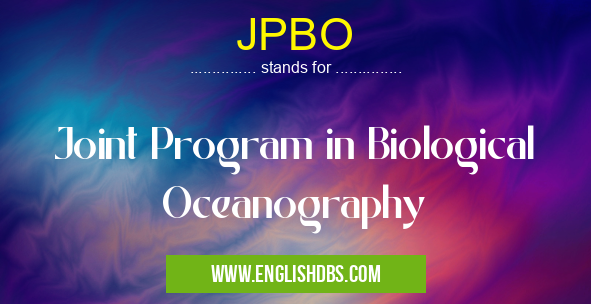What does JPBO mean in BIOLOGY
JPBO stands for Joint Program in Biological Oceanography. It is a collaborative effort between the Massachusetts Institute of Technology (MIT) and the Woods Hole Oceanographic Institution (WHOI). The program was established in 1968 to train students in the field of biological oceanography.

JPBO meaning in Biology in Academic & Science
JPBO mostly used in an acronym Biology in Category Academic & Science that means Joint Program in Biological Oceanography
Shorthand: JPBO,
Full Form: Joint Program in Biological Oceanography
For more information of "Joint Program in Biological Oceanography", see the section below.
Program Overview
The JPBO program offers a unique curriculum that combines classroom instruction with hands-on research experience. Students take courses in a variety of biological and physical oceanographic disciplines, including:
- Biological Oceanography
- Chemical Oceanography
- Geological Oceanography
- Physical Oceanography
- Marine Ecology
- Marine Microbiology
In addition to coursework, students conduct research under the supervision of faculty members from both MIT and WHOI. This research experience provides students with the opportunity to apply their knowledge and skills to real-world problems.
Benefits of the Program
The JPBO program offers a number of benefits to students, including:
- A rigorous curriculum that prepares students for careers in biological oceanography
- Access to world-class faculty and research facilities at MIT and WHOI
- A supportive learning environment that fosters collaboration and innovation
- A strong alumni network that provides opportunities for networking and career advancement
Career Opportunities
Graduates of the JPBO program go on to pursue a variety of careers in biological oceanography. These careers include:
- Research scientist
- College or university professor
- Government scientist
- Environmental consultant
- Marine policy maker
Conclusion
The JPBO program is a highly regarded training program for students interested in pursuing a career in biological oceanography. The program offers a rigorous curriculum, world-class faculty and research facilities, and a supportive learning environment. Graduates of the program go on to pursue successful careers in a variety of fields.
Essential Questions and Answers on Joint Program in Biological Oceanography in "SCIENCE»BIOLOGY"
What is the Joint Program in Biological Oceanography (JPBO)?
The JPBO is a collaborative academic program between MIT and the Woods Hole Oceanographic Institution (WHOI), offering advanced degrees in Biological Oceanography. This interdisciplinary program combines the strengths of both institutions, providing students with a unique educational experience.
What are the degree options offered by the JPBO?
The JPBO offers a Doctor of Philosophy (PhD) degree in Biological Oceanography. Students may also pursue a Master of Science (MSc) degree as part of their PhD coursework.
What are the research areas covered by the JPBO?
The JPBO covers a broad range of research topics in Biological Oceanography, including:
- Marine ecology and evolution
- Microbial oceanography
- Biogeochemistry
- Marine molecular biology
- Ocean modeling and remote sensing
What are the admission requirements for the JPBO?
Applicants to the JPBO must have a strong academic background in the natural sciences, particularly in biology, chemistry, and mathematics. They should also have a demonstrated interest in conducting original research in Biological Oceanography.
What are the career opportunities for graduates of the JPBO?
Graduates of the JPBO are well-prepared for careers in academia, government, and the private sector. They may pursue positions as researchers, educators, policy analysts, or entrepreneurs in fields related to Biological Oceanography.
